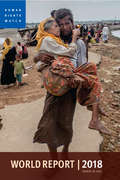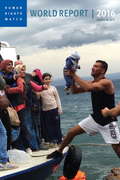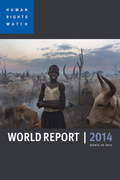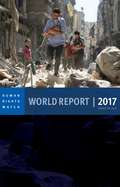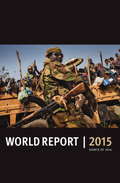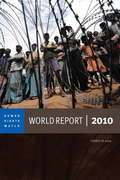Special Collections
Human Rights Collection
- Table View
- List View
World Report 2018
by Human Rights Watch and Kenneth RothThe human rights records of more than ninety countries and territories are put into perspective in Human Rights Watch's signature yearly report. Reflecting extensive investigative work undertaken in 2016 by Human Rights Watch staff, in close partnership with domestic human rights activists, the annual World Report is an invaluable resource for journalists, diplomats, and citizens, and is a must-read for anyone interested in the fight to protect human rights in every corner of the globe.
World Report 2016
by Human Rights Watch and Kenneth RothThe human rights records of more than ninety countries and territories is put into perspective in Human Rights Watch's signature yearly report. Reflecting extensive investigative work undertaken in 2015 by Human RightsWatch staff, in close partnership with domestic human rights activists, the annual World Report is an invaluable resource for journalists, diplomats, and citizens, and is a must-read for anyone interested in the fight to protect human rights in every corner of the globe.From the Trade Paperback edition.
World Report 2013
by Human Rights Watch and Kenneth Roth"The reports of the New York-based Human Rights Watch have become extremely important. . . . Cogent and eminently practical, these reports have gone far beyond an account of human rights abuses. . . ."--Ahmed Rashid in The New York Review of Books"An attempt to bring rationality where emotion tends to dominate."--Simon Jenkins, former editor of The Times (London) In the aftermath of 2011's Arab Spring uprisings, unexpected new challenges and imperatives of building rights-respecting democracies appeared in their wake. Human Rights Watch's 23rd annual World Report explores these new challenges and summarizes human rights conditions and practices in more than 90 countries and territories worldwide, reflecting extensive investigative work by Human Rights Watch staff. Human Rights Watch's World Report 2013 is the global rights watchdog's flagship annual review of global trends and news in human rights. An invaluable resource for journalists, diplomats, and citizens, it features not only incisive country surveys but also several hard-hitting essays highlighting key human rights issues, including:*An introduction by Human Rights Watch Executive Director Ken Roth on how the Arab Spring shows us that toppling dictators may yet prove to be easier than the tough, complicated process of building a rights-respecting democracy;*An essay on a Human Rights Council resolution on "traditional values" sponsored by Russia, and the implicit dangers this could mean for LGBT rights; *An essay on the failure of many global businesses to operate with sufficient regard to human rights, and of governments to oversee them--leading to abuses such as the use of forced labor on a Canadian construction site in Eritrea, or the gang rapes of women by security guards employed by an international mining giant in Papua New Guinea.World Report 2013 also features striking photo essays by award winning photographers.
World Report 2017
by Human Rights Watch and Kenneth RothThe human rights records of more than ninety countries and territories are put into perspective in Human Rights Watch's signature yearly report. Reflecting extensive investigative work undertaken in 2016 by Human Rights Watch staff, in close partnership with domestic human rights activists, the annual World Report is an invaluable resource for journalists, diplomats, and citizens, and is a must-read for anyone interested in the fight to protect human rights in every corner of the globe.From the Trade Paperback edition.
Ravaging the Vulnerable
by Human Rights WatchBangladesh is stoking an emerging AIDS epidemic with violent police abuse of sex workers, injection drug users and men who have sex with men. In this 51-page report, Human Rights Watch documents rapes, gang-rapes, beatings and abductions by both police officers and powerful criminals known as mastans. Their targets -- sex workers, men who have sex with men and injection drug users -- are both at high risk of HIV infection and the people most capable of bringing AIDS information and services to their peers. In a direct blow to the fight against AIDS, some of the abuses are committed against AIDS outreach workers. In one region of Bangladesh, HIV prevalence among injection drug users jumped from 1.7 percent in 2001 to 4 percent in 2002. While HIV prevalence in the population overall is reportedly still low, the country's poverty, gender inequality, and proximity to raging epidemics in India and Southeast Asia point to the possibility of an AIDS explosion. Human Rights Watch urged Bangladesh to institute civilian review of police officers, to prosecute police and mastans who perpetrate abuses, to bring its criminal procedures in line with international standards, and to support peer-driven AIDS prevention services among persons at high risk of HIV.
Hidden in the Mealie Meal
by Human Rights WatchWhile acknowledging the significant overall progress made by the Zambian government in scaling up HIV treatment generally, this report documents how the government has fallen short of its international legal obligations to combat violence and discrimination against women. The report details abuses that obstruct women's ability to start and adhere to HIV treatment regimens, including violence against women and insecure property rights that often force women into poverty and dependent, abusive relationships.
Chronic Indifference
by Human Rights WatchThis 71-page report documents the experiences of HIV-positive detainees in immigration custody whose HIV treatment was denied, delayed, or interrupted, resulting in serious risk and often damage to their health. The investigation included interviews with current and former detainees, DHS and detention facility officials, and an independent medical review of treatment provided. Detention facilities which housed immigrants with HIV infection failed to consistently deliver anti-retroviral medications, conduct necessary laboratory tests, ensure continuity of care, and ensure confidentiality or protection from discrimination.
Impairing Education
by Human Rights WatchIn this 70-page report, the ACLU and Human Rights Watch found that students with disabilities made up 18.8 percent of students who suffered corporal punishment at school during the 2006-2007 school year, although they constituted just 13.7 percent of the total nationwide student population. At least 41,972 students with disabilities were subjected to corporal punishment in US schools during that year. These numbers probably undercount the actual rate of physical discipline, since not all instances are reported or recorded.
Borderline Slavery
by Human Rights WatchWest African governments are failing to address a rampant traffic in child labor that could worsen with the region's growing AIDS crisis, Human Rights Watch charged in a new report released today. The 79-page report, "Borderline Slavery: Child Trafficking in Togo," highlights Togo as a case study of trafficking in the region. The report documents how children as young as three years old are exploited as domestic and agricultural workers in several countries.
Deadly Denial
by Human Rights WatchThis 57-page report found that routine police harassment and arrest - as well as the lasting effects of former Prime Minister Thaksin Shinawatra's 2003 drug war - keeps drug users from receiving lifesaving HIV information and services that Thailand has pledged to provide. The report also documents how drug users face discrimination from health care workers, who continue to deny antiretroviral treatment to people who need it based on their status as drug users.
Neighbors In Need
by Human Rights WatchThis 119-page report examines South Africa's decision to treat Zimbabweans merely as voluntary economic migrants and its failure to respond effectively to stop the human rights abuses and economic deprivation in Zimbabwe that cause their flight and to address their needs in South Africa. Human Rights Watch spoke to almost 100 Zimbabweans in South Africa about their plight.
"Life Doesn't Wait"
by Human Rights WatchMore than 7,200 Romanian children and youth aged 15 to 19 are living with HIV. The vast majority were infected with HIV between 1986 and 1991 as a direct result of government policies that exposed them to contaminated needles and "microtransfusions" in which small children were injected with unscreened blood in the mistaken belief that this would improve their health.
Hated to Death
by Human Rights WatchJamaica's growing HIV/AIDS epidemic is unfolding in the context of widespread violence and discrimination against people living with and at high risk of HIV/AIDS, especially men who have sex with men. Myths about HIV/AIDS persist. Many Jamaicans believe that HIV/AIDS is a disease of homosexuals and sex workers whose "moral impurity" makes them vulnerable to it, or that HIV is transmitted by casual contact.
Just Die Quietly
by Human Rights WatchThe Ugandan government's failure to protect women from domestic violence and discrimination increases women's risk of contracting HIV. This 77-page report documents widespread rape and brutal attacks on women by their husbands in Uganda, where a specific domestic violence law has not been enacted and where spousal rape is not criminalized. Many women told Human Rights Watch that a fear of violent repercussions impeded their access to HIV/AIDS information, HIV testing, and HIV/AIDS treatment and counseling. The Human Rights Watch report says that HIV/AIDS programs focusing on fidelity, abstinence, and condom use do not account for the ways in which domestic violence inhibits women's control over sexual matters in marriage. In the report, Human Rights Watch urges the Ugandan government to enact domestic violence legislation, and to make women's health, physical integrity, and equal rights in marriage a central focus of AIDS programming.
Barred from Treatment
by Human Rights WatchIn this 53-page report, Human Rights Watch found that New York prison officials sentenced inmates to a collective total of 2,516 years in disciplinary segregation from 2005 to 2007 for drug-related charges. At the same time, inmates seeking drug treatment face major delays because treatment programs are filled to capacity. When sentenced to segregation, known as "the box," inmates are not allowed to get or continue to receive treatment. Conditions in the box are harsh, with prisoners locked down 23 hours a day and contact with the outside through visitors, packages, and telephone calls severely restricted.
A Testing Challenge
by Human Rights WatchThis 60-page report found that the Know Your Status (KYS) campaign, begun in 2005 with the goal of testing 1.3 million people, was underfunded and had tested only 25,000 people by August 2007, four months before the campaign ended. Ambitious goals to train and pay thousands of lay counselors and expand support groups for people living with HIV were largely sidelined. Supervision of counselors and post-test referrals to HIV prevention or treatment was poorly carried out. The program also took insufficient steps to ensure proper respect for such rights-related requirements as informed consent and confidentiality.
An Unbreakable Cycle:Drug Dependency Treatment, Mandatory Confinement, and HIV/AIDS in China’s Guangxi Province
by Human Rights WatchIn China, illicit drug use is an administrative offense and Chinese law dictates that drug users "must be rehabilitated." In reality, police raids on drug users often drive them underground, away from methadone clinics, needle exchange sites, and other proven HIV prevention services. And every year Chinese police send tens of thousands of drug users to mandatory drug treatment centers, often for years, without trial or due process. This report finds that most mandatory treatment centers, while ostensibly meant to provide drug treatment, do not actually offer forms of drug dependence treatment internationally recognized as effective. Mostly, drug users are forced to work or to spend their days in crowded cells little different from prisons.
Restrictions on AIDS Activists in China
by Human Rights WatchThis 57-page report based on on-the-ground interviews with Chinese AIDS activists, gay rights activists, activists working with drug users, and website managers shows that while senior officials have said they want to encourage China's emerging civil society, many AIDS activists face state harassment and bureaucratic restrictions. First-hand accounts provided to Human Rights Watch reveal that activists conducting AIDS information workshops or working with those at high risk of HIV have been harassed or detained, and that pornography laws are used to censor websites providing AIDS information to gay men and lesbians under pornography laws.
Abusing the User:Police Misconduct, Harm Reduction and HIV/AIDS in Vancouver
by Human Rights WatchAn anti-drug crackdown by the Vancouver Police Department has driven injection drug users away from life-saving HIV prevention services, raising fears of a new wave of HIV transmission in the city that is already home to the worst AIDS crisis in the developed world, said Human Rights Watch. In a 25-page report released today, "Abusing the User: Police Misconduct, Harm Reduction and HIV/AIDS in Vancouver," Human Rights Watch documents instances of unnecessary force and mistreatment, arbitrary arrest, and other intimidation and harassment of drug users as part of a campaign commonly referred to as Operation Torpedo. The crackdown began on April 7 in the city's impoverished Downtown Eastside neighborhood. Though drug traffickers are the ostensible target, drug users not charged with selling drugs have been driven to places where health workers cannot reach them to ensure access to sterile syringes and other HIV prevention services.
"I Had To Run Away"
by Human Rights WatchThis 120-page report is based on 58 interviews conducted in three prisons and three juvenile detention facilities with women and girls accused of "moral crimes." Almost all girls in juvenile detention in Afghanistan had been arrested for "moral crimes," while about half of women in Afghan prisons were arrested on these charges. These "crimes" usually involve flight from unlawful forced marriage or domestic violence. Some women and girls have been convicted of zina, sex outside of marriage, after being raped or forced into prostitution. The fall of the Taliban government in 2001 promised a new era of women's rights. Significant improvements have occurred in education, maternal mortality, employment, and the role of women in public life and governance. Yet the imprisonment of women and girls for "moral crimes" is just one sign of the difficult present and worrying future faced by Afghan women and girls as the international community moves to decrease substantially its commitments in Afghanistan.
World Report 2015
by Human Rights WatchThe human rights records of more than ninety countries and territories is put into perspective in Human Rights Watch's signature yearly report, which, in the 2014 volume, highlighted the armed conflict in Syria, international drug reform, drones and electronic mass surveillance, and more, and also featured photo essays of child marriage in South Sudan, the cost of the Sochi Winter Olympics in Russia, and religious fighting in Central African Republic. Reflecting extensive investigative work undertaken in 2014 by Human Rights Watch staff, in close partnership with domestic human rights activists, the annual World Report 2015 is an invaluable resource for journalists, diplomats, and citizens, and is a must-read for anyone interested in the fight to protect human rights in every corner of the globe.From the Trade Paperback edition.
World Report 2009
by Human Rights WatchHuman Rights Watch is increasingly recognized as the world's leader in building a stronger awareness for human rights. Their annual World Report is the most probing review of human rights developments available anywhere. Written in straightforward, non-technical language, Human Rights Watch World Report prioritizes events in the most affected countries during the previous year. The backbone of the report consists of a series of concise overviews of the most pressing human rights issues in countries from Afghanistan to Zimbabwe, with particular focus on the role--positive or negative--played in each country by key domestic and international figures. Highly anticipated and widely publicized by the U.S. and international press every year, the World Report is an invaluable resource for journalists, diplomats, and all citizens of the world.
Beyond Reason
by Human Rights WatchTwenty-five U.S. states still permit the execution of offenders with mental retardation and should pass laws to ban the practice without delay. The United States appears to be the only democracy whose laws expressly permit the execution of persons with this severe mental disability.
No Easy Answers
by Human Rights WatchThis 146-page report is the first comprehensive study of US sex offender policies, their public safety impact, and the effect they have on former offenders and their families. During two years of investigation for this report, Human Rights Watch researchers conducted over 200 interviews with victims of sexual violence and their relatives, former offenders, law enforcement and government officials, treatment providers, researchers, and child safety advocates.
Collateral Casualties
by Human Rights WatchExcessively severe drug laws have deprived thousands of children of their parents, Human Rights Watch said today. Governor Pataki and New York politicians in Albany are now debating legislation to reform these drug laws.Releasing a new report with the first statistics on the number of children in New York who have had parents sent to prison for drug offenses, Human Rights Watch said the statistics should spur a swift agreement on major reform of the state's drug laws.Human Rights Watch has consistently urged New York to eliminate harsh mandatory minimum sentences for drug offenders and to authorize judges to tailor criminal sanctions that reflect the individual offender's conduct and other relevant factors.
